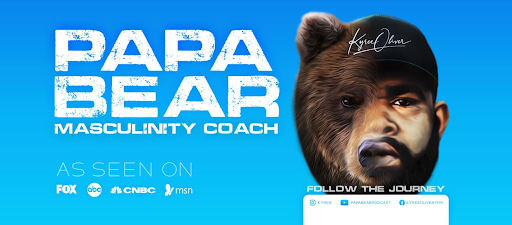“It’s something like going on an ocean voyage. What can I do? Pick the captain, the boat, the date, and the best time to sail. But then a storm hits… What are my options? I do the only thing I am in a position to do, drown — but fearlessly, without bawling or crying out to God, because I know that what is born must also die.”
~Epictetus
Greetings from LA and Hawaii.
This week we interviewed a masculinity coach, watched a documentary about Instagram con artists (aka influencers), listened to a podcast that reminded us to be grateful (“regardless”), and read about why humans are so bad at spotting liars. Our challenge is for you to ask yourself three provocative questions and spend a bit of time thinking about them.
Papa Bear

This week we interviewed Facebook advertiser and masculinity coach, Kyree Oliver. He’s pulled in more than $85 million collectively for his clients and interviewed hundreds of people to understand human behavior.
When we asked him how someone can determine their identity and remain consistent with their values, he said,
“Practice. Just like anything else, it’s repetition. It’s how do I solidify myself with external things going on, with external distractions. How do I maintain this sense of self… I think it starts off with saying ‘What do I want?’ And then, ‘Who do I need to become in order to get what I want?’
Having a clear vision for your life is super important. If I can paint a picture of who I want to be 20 years down the road, I need to get really clear with that person, I need to develop a relationship with that person. I know it sounds weird to some people, but I need to develop a relationship with my future self.
I think you do that in your alone time. I think you do that when you’re meditating. I think you do that sitting on the toilet. I think you can do that laying in bed at night… those moments of solitude are where you really find yourself and create a relationship with that future self. Then it’s just checking in with yourself consistently, whenever you need to make a decision; does this serve my future self? Will my future self look back on this with pride?”
You can learn more about Kyree over here.
“Be Grateful, Regardless”
On episode 1094 of The School of Greatness podcast, host Lewis Howes speaks with Jordan Peterson about building confidence, cultivating inner peace, and the psychology of money. But our favorite part was at the end when Howes asked Peterson what lessons he would like to leave with his audience after he dies, one of which was, “Be grateful, regardless.”
That’s a statement that’s worth thinking about.
Fake Famous

The HBO documentary, Fake Famous, was released at the beginning of this year. In it, Nick Bilton — first-time director and veteran journalist — and his team select three people (the people shown in the image above) to try and make “fake famous” on Instagram. They buy followers, comments, and likes, they fake glamorous photos of “vacations” to exquisite destinations, and they even try to build paid partnerships with brands. The results of the experiment are fascinating and disturbing… turns out, it’s relatively simple to get businesses to pay you to reach an entirely fake Instagram following.
(Half-way through the experiment, Nick Bilton even runs each of his “influencer’s” Instagram account through software that’s built to determine if an Instagram profile’s followers are real… it says they are)
The bad news is that many “influencers” are just con artists (surprise, surprise). The good news is that most of those influencers you’re jealous of aren’t nearly as successful as they pretend to be.
Truth Default
Why was Neville Chamberlain (Winston Churchill’s predecessor) — the only allied leader to spend significant time with Adolf Hitler — so easily deceived by Hitler’s promises of peace? Why does an AI do a far better job (25% better, according to Stanford research) than America’s Judges at determining whether someone will commit a crime? How did Ana Montes trick her CIA comrades for 16 years (from 1985 to 2001) when she was actually a Cuban spy?
Those are the questions that Malcolm Gladwell asks in Talking to Strangers: What We Should Know About The People We Don’t Know.
His answer is as follows:
“We have a default to truth: our operating assumption is that the people we are dealing with are honest.”
He continues…
“We start by believing. And we stop believing only when our doubts and misgivings rise to the point where we can no longer explain them away.”
In the case of Ana Montes,
“Ana Montes wasn’t a master spy. She didn’t need to be. In a world where our lie detector is set to the ‘off’ position, a spy is always going to have an easy time of it.”
So why would evolution program us to default to truth? Well, it’s because defaulting to believe that others are truthful has natural benefits for the survival of our species. Timothy Levine, Distinguished Professor and Chair of Communication Studies at University of Alabama at Birmingham, explains…
“Being deceived once in a while is not going to prevent us from passing on our genes or seriously threaten the survival of the species. Efficient communication, on the other hand, has huge implications for our survival. The trade-off just isn’t much of a trade-off.”
Of course, this doesn’t mean we should stop trusting our neighbors. It just provides some valuable insight into how human minds operate — if there’s a question to be asked, it shouldn’t be about interpersonal relationships, but about the functioning of our justice system and society as a whole when it comes to determining guilt and punishing those who turn a blind eye to seemingly clear-cut evidence of criminal activity.
Extra Stuff
Here’s some additional stuff that caught our attention this week.
The Unmatched Bravery of the Harlem Hellfighters by Smithsonian Magazine
Diverse linguistic environment boosts brain sensitivity to new learning by Neuroscience News
The Weekly Challenge
This week we want you to ask yourself the following three questions and spend 15-30 minutes (each) thinking about your answers. There are no right or wrong answers. The goal is simply to spend some time in thoughtful consideration.
- What are you grateful for?
- Why do you worry about what other people think?
- Who do you want to be in 10 years?
Until next week!
Mike & Alec
